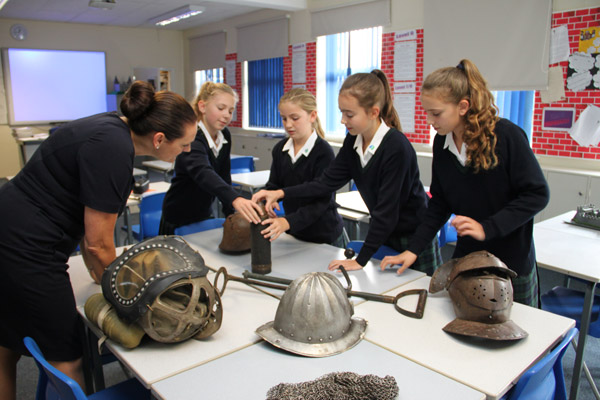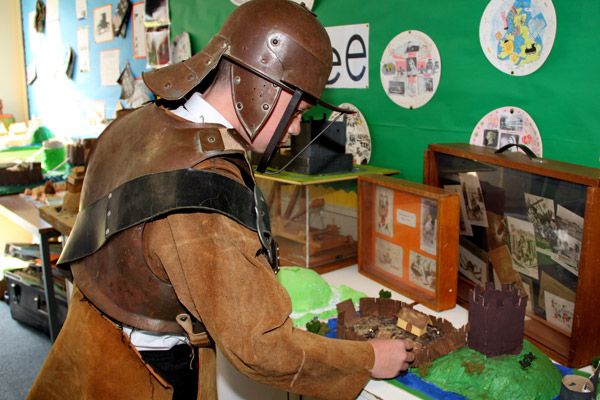“The farther backward you can look the farther forward you are likely to see.” ― Winston S. Churchill
History is important in helping young people understand how the past has shaped the present and will affect the future. It also enables young people to learn the historical skills of analysis, comparison, and synthesis. These skills are highly relevant to each student’s employment potential. History provides an opportunity to consider issues of justice and morality and contributes to the fostering of positive values in our students.
KEY STAGE THREE CURRICULUM
Students study a range of topics at Key Stage Three.
In Year 7, students consider who the best Medieval King was by learning about monarchs and their actions between 1066 and 1450. They also learn about what it was like to live in Medieval England and have the opportunity to take their learning outside of the classroom in our Forest School.
In Year 8, students study the 16th and 17th centuries exploring the Tudor monarchs and the huge changes they brought to society and the impact of the English Civil War. They also have the chance to complete a personal project on an aspect of life in the 17th century such as witchcraft, the Great Fire of London or The Plague.
In Year 9, students decide if the period 1750-1900 was ‘An Age of Progress’. They then complete their studies by looking at what the 20th century will be remembered for.
KEY STAGE FOUR CURRICULUM
Students study AQA History B (9145); Modern World History. The GCSE is made up of Three Units;
Unit 1: International Relations: Conflict and Peace in the 20th Century (91451). Topics include The Causes of the First World War, The Treaty of Versailles and League of Nations and The Causes of the Second World War.
Unit 2: 20th Century Depth Studies (91452. Topics include The USA in the 1920s, Hitler’s Germany 1929-1945 and Civil Rights in the USA 1945-1968.
Unit 3: Controlled Assessment. This is worth 25% of the final grade and is completed at the start of Year 11. Students study two aspects of the British People in War. Recent topics have included The Role of Women, Rationing and the Impact of Bombing.
A-LEVEL CURRICULUM
Students study OCR History A – H105 (AS) and H505 (A2).
At AS students study European and British History in the 16th century. This is divided into two papers. One paper is based on the reign of Philip II of Spain and the other is based on ‘the Mid-Tudor Crisis’ which spans the reigns of Henry VIII, Edward VI, Mary I and Elizabeth I.
At A2, students sit one examination based on Civil Rights in the USA 1865-1992. Topics include African American Rights, Women’s Rights, Trade Unions, and Native Americans. Students also have the chance to complete a personal study of a topic of their choice from any period of History as their coursework element.
DIGITAL LEARNING
The History Department uses digital learning in a variety of ways. The main use in History is for research purposes as students will always achieve the highest levels and grades by looking at different interpretations of the past. Within lessons, students have also used a range of activities from websites such as BBC History, SchoolHistory.co.uk, and Historyonthenet. Classes have also completed activities on their iPads on Socrative and Popplet.
ENRICHMENT ACTIVITIES
The department has had a History film club for a number of terms, giving students the chance to see events in History from another perspective. The staff in the department also run their own enrichment activities. Mr. Russell supports the PE department with football and cricket and Mrs, Casey runs a dance club at lunch time. The department has entered students into the St Hilda’s College Oxford History Essay Prize Competition with all applicants achieving Highly Commended with their entries.
WHERE DOES HISTORY LEAD YOU?
Apart from the vast general knowledge that comes with studying History, students have the chance to learn vital skills that are applicable in many professions including law and medicine. Students learn how to conduct research, judge the use of evidence and present an argument. These skills are useful in any future career.
STAFF NAMES
Mrs. Susan Casey – Head of History
Mr. Paul Russell – teacher of History and Classics.

